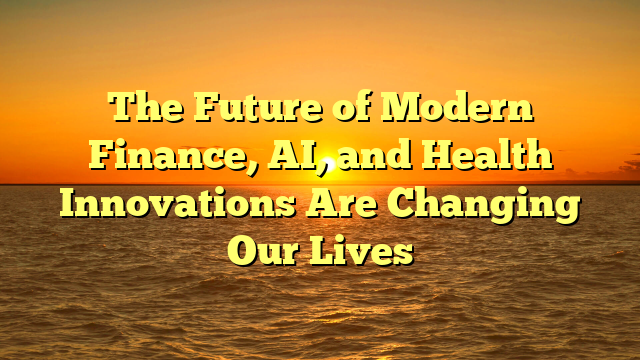
Introduction
In today’s rapidly evolving world, finance, technology, intelligence, and health sectors are increasingly interconnected, shaping our daily lives in profound ways. Each of these domains has its own unique challenges and opportunities, but when combined, they hold the potential to bring about transformative changes in the way we approach financial management, technological advancements, intelligence enhancement, and healthcare. This article will explore how these areas are converging, driving innovation, and what the future might hold for each of these domains.
—
Section 1: Finance and Technology – A Symbiotic Relationship
The rise of digital technology has revolutionized the financial landscape. samosir88 are disrupting traditional banking systems, offering innovative solutions such as digital wallets, online banking platforms, and peer-to-peer payment systems. One of the most significant advancements in recent years has been the rise of cryptocurrencies, which use blockchain technology to provide decentralized, secure financial transactions.
Blockchain innovation is just one example of how finance is becoming more integrated with technology. It provides a transparent and immutable ledger, which enhances trust and security in financial transactions. Beyond cryptocurrencies, blockchain can be applied in various sectors, including supply chain management, real estate, and even voting systems. The potential applications of blockchain in finance are vast and still largely untapped.
Another key area where finance and technology intersect is in the development of Artificial Intelligence (AI) and machine learning (ML). These technologies are being used to automate trading, optimize investment strategies, and improve financial forecasting. AI-powered algorithms can analyze vast amounts of data to identify trends and patterns, allowing investors to make more informed decisions. This technology has made it easier for individuals to access the stock market and for financial institutions to enhance their services.
Moreover, the adoption of AI in finance is improving fraud detection systems. With the ability to analyze patterns and detect anomalies in real-time, AI is significantly reducing the risk of financial fraud, a major concern for both consumers and institutions. As financial technology continues to advance, the lines between traditional finance and tech-driven solutions will blur, creating a more seamless and efficient financial ecosystem.
—
Section 2: The Role of Intelligence in Advancing Finance and Technology
Intelligence plays a crucial role in both finance and technology. Cognitive computing refers to systems that simulate human intelligence and are capable of learning, reasoning, and understanding data. In finance, cognitive computing can be used to enhance decision-making processes, reduce risk, and improve customer experiences.
Intelligence also plays a critical role in the optimization of technological systems. For instance, AI and machine learning algorithms are designed to mimic the decision-making abilities of the human brain. These algorithms are becoming more advanced, capable of learning from vast amounts of data, and making decisions faster and more accurately than humans. This ability is invaluable in sectors such as finance, where real-time decisions and predictions are essential.
In the realm of healthcare, intelligent systems are driving medical breakthroughs. AI-powered diagnostic tools can analyze medical images and data to identify diseases and conditions faster than traditional methods. These tools not only assist healthcare professionals in providing accurate diagnoses but also offer personalized treatment plans, enhancing patient care. As AI continues to evolve, the potential for more intelligent systems in both finance and healthcare will undoubtedly lead to further advancements in both fields.
—
Section 3: Health and Technology – A New Era of Wellness
The integration of technology in healthcare is transforming the way we approach medical treatments and wellness. From telemedicine and wearable health devices to AI-driven diagnostic tools, technology is enabling more personalized and accessible healthcare solutions. This is particularly significant in a world where access to quality healthcare is not always readily available.
Wearable health devices, such as smartwatches and fitness trackers, have revolutionized the way we monitor our health. These devices can track vital signs, monitor physical activity, and even detect early signs of illness. The data collected by these devices can be analyzed using AI to provide personalized health insights and recommendations, allowing individuals to take proactive steps toward maintaining their health.
Telemedicine has also seen significant growth, especially in the wake of the COVID-19 pandemic. With the rise of virtual consultations, patients can now access healthcare services from the comfort of their homes. This has not only made healthcare more accessible but also reduced the strain on healthcare systems by providing a more efficient way to handle routine consultations.
Another area where technology is improving health is in the field of genomics. Advances in gene-editing technologies, such as CRISPR, have opened new doors for treating genetic disorders. These innovations are making it possible to target the root cause of diseases, offering the potential for more effective and personalized treatments.
—
Section 4: The Future of Health, Technology, Intelligence, and Finance
The future of healthcare, technology, intelligence, and finance is exciting, as the convergence of these fields promises to create unprecedented opportunities for innovation and progress. As technology continues to evolve, it is likely that the boundaries between these domains will continue to blur, leading to more integrated and holistic solutions for individuals and businesses alike.
In finance, we can expect further advancements in AI and blockchain technology, which will continue to disrupt traditional systems and create more efficient and secure ways to manage money. The growing use of AI in investment and trading will democratize access to financial markets, enabling individuals to make more informed financial decisions.
In healthcare, the integration of AI, wearables, and genomics will lead to more personalized and preventive healthcare solutions. Individuals will be able to monitor their health in real-time and make data-driven decisions to improve their well-being. The collaboration between healthcare professionals and intelligent systems will enhance the accuracy of diagnoses and treatments, leading to better health outcomes.
As intelligence continues to improve, both in humans and machines, we will see smarter systems that can make more complex decisions and solve problems faster and more efficiently. This will have a profound impact not only on finance, technology, and health but on all areas of society.
—
Conclusion
The convergence of technology, intelligence, finance, and health is a powerful force that is reshaping the world as we know it. These fields are no longer isolated but are increasingly intertwined, creating opportunities for new innovations that have the potential to improve our financial systems, technological advancements, cognitive capabilities, and healthcare solutions. As we look to the future, it is clear that the collaboration between these domains will play a crucial role in shaping a smarter, healthier, and more prosperous world.



